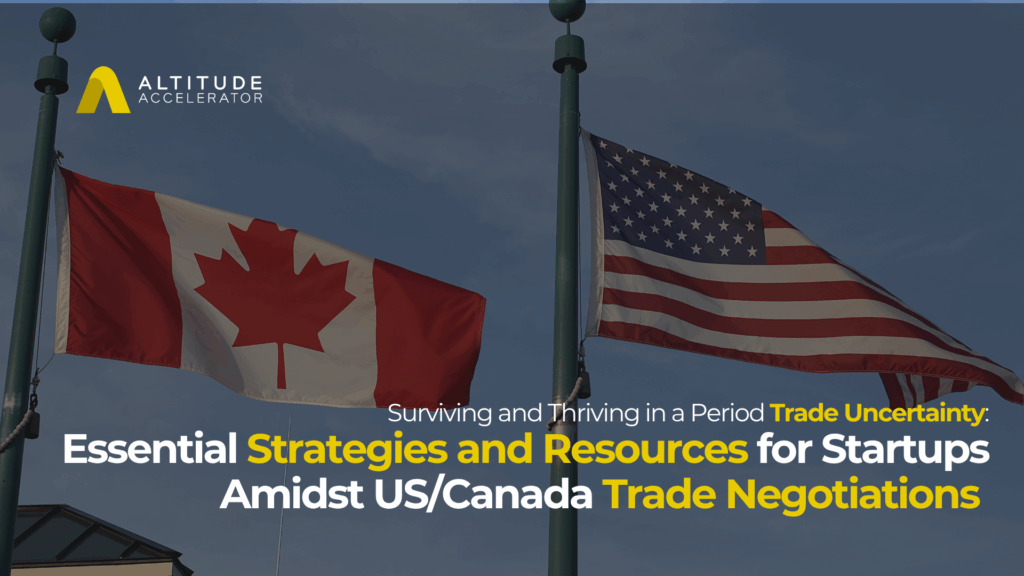Home » Navigating Trade Uncertainty: Key Strategies and Resources for Startups During US-Canada Trade Negotiations
Navigating Trade Uncertainty: Key Strategies and Resources for Startups During US-Canada Trade Negotiations

Since the U.S. announced a 25% tariff on Canadian imports on February 4, 2025, consumer and business anxiety has surged, with a resolution anticipated by summer. A survey conducted by MaRS Discovery District and Communitech among 175 Canadian startups in sectors like healthtech and cleantech highlighted significant concerns regarding the tariff's implications. Key findings from the survey include:
- Revenue Impact: 70% of the surveyed startups generated revenue from the U.S. in 2024, and 41% expect that the proposed tariffs could directly affect their 2025 revenue.
- Sourcing Vulnerabilities: 58% expressed worries about sourcing materials across the border, while 64% do not plan to reduce their workforce despite economic uncertainties.
- International Expansion Concerns: 26% of startups are reconsidering international expansion plans.
The reliance on U.S. revenue underscores the necessity for these startups to diversify their markets and supply chains. They are now reevaluating their relationships with U.S. partners in light of rising trade tensions.
Sustainable Business Strategies
The enforcement of tariffs presents challenges, especially for tech startups producing tangible goods in advanced manufacturing, clean tech, and IoT sectors. Brigitte LeBlanc Lapointe of Norton Rose Fulbright underscores the importance of scrutinizing contract details related to delivery prices and import taxes. Businesses should assess whether their supply chains can be diversified, focusing on countries with existing free trade agreements with Canada, such as those with the EU and Trans-Pacific nations.
To adapt to these rapidly changing circumstances, businesses must adopt a new planning approach. The immediate aftermath requires a focus on liquidity, profitability, productivity, and debt leverage. A medium-term plan should include strategies for cost management, pricing reassessment, and supply chain adjustments. An extended view, looking six months ahead, emphasizes the importance of diversification across customers, suppliers, and channels.
Government Programs and Resources
Various federal support programs aim to assist businesses impacted by the tariffs:
- EDC’s Trade Impact Program: Allocating $5 billion over two years to help exporters in navigating economic challenges like currency fluctuations and non-payment.
- BDC’s Pivot to Grow Program: Offering $500 million in financial assistance to small and medium businesses affected by U.S. tariffs.
- Farm Credit Canada’s Trade Disruption Support: Providing $1 billion in financing for Canadian agriculture and food sectors facing cash flow difficulties.
- Expanded Employment Insurance Work-Sharing Program: Aids employers avoid layoffs during periods of business downturn due to external factors.
At the provincial level, initiatives like Ontario’s Trade-Impacted Communities Program provide tailored support to local industries facing economic challenges from U.S. policy changes. Additionally, local efforts in Brampton include establishing a Tariffs Resource Hub for businesses and promoting "Made in Canada" procurement practices, which aim to strengthen local resilience against the impact of tariffs.
Organizations like Altitude Accelerator are well-positioned to assist innovators in navigating these challenges. By leveraging expertise and access to public support, they can help businesses mitigate export uncertainties and optimize their growth trajectories in a volatile market.
For further support, interested parties are encouraged to reach out to Altitude Accelerator for information and guidance on managing the impact of these tariffs.
Altitude Accelerator
https://altitudeaccelerator.ca/
Altitude Accelerator is a not-for-profit innovation hub and business incubator for Brampton, Mississauga, Caledon, and other communities in Southern Ontario. Altitude Accelerators’ focus is to be a dynamic catalyst for tech companies. We help our companies grow faster and stronger. Our strength is our proven ability to foster growth for companies in Advanced Manufacturing, Internet of Things, Hardware & Software, Cleantech and Life Sciences. Our team consists of more than 100 expert advisors, industry, academic, government partners. The team helps companies in Advanced Manufacturing, Internet of Things, Hardware & Software, Cleantech and Life Sciences to commercialize their products and get them to market faster.


